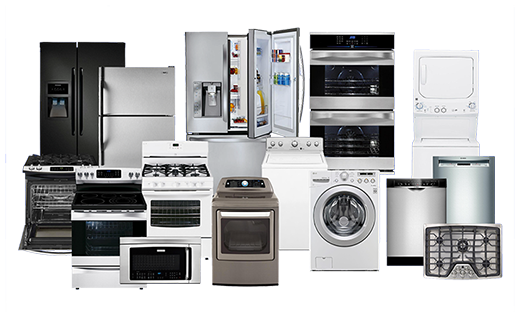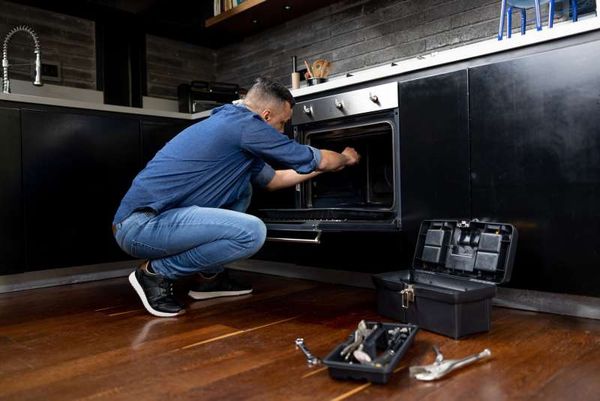OEM vs. Aftermarket – Dependable Refrigeration & Appliance Repair Service Washing Machine Repair
OEM vs. Aftermarket – Dependable Refrigeration & Appliance Repair Service Washing Machine Repair
Blog Article
The Ultimate Guide to Recognizing Device Fixing at Home
When your refrigerator stops cooling down or your stove rejects to warm, it can really feel frustrating. Recognizing device fixing in your home can conserve you money and time. You'll discover to identify signs and symptoms, make use of crucial devices, and follow a systematic troubleshooting procedure. Before you begin, there are essential security precautions you need to take into account. What are one of the most typical issues, and exactly how can you fix them? Let's discover the fundamentals.
Common Device Problems and Their Symptoms
When your appliances begin breaking down, it's necessary to recognize the indicators early. Ignoring them can lead to larger problems and expensive repair work. If your fridge isn't cooling correctly, you could see cozy areas or condensation creating. This can show a stopping working compressor or a blocked vent.Your dishwasher may reveal issues through dirty recipes or uncommon sounds during cycles. If you hear grinding or clanking, it's time to investigate.A washing machine that won't spin or drain can leave you with soggy laundry, suggesting a blocked drainpipe or a malfunctioning pump.Lastly, if your stove's temperature level seems off or it takes forever to preheat, you could be dealing with a damaged thermostat. By remaining sharp to these signs, you can deal with problems before they escalate into significant repair work.
Important Devices for Home Appliance Repair
When you're tackling home appliance repairs in the house, having the right tools is vital. Standard hand tools like screwdrivers and pliers will certainly help you dismantle and take care of numerous home appliances, while electrical testing tools assure you're working safely with wiring. Allow's go over what you need to begin on your repair service trip.
Standard Hand Devices
Having the right devices is important for reliable home appliance fixing at home. Beginning with a dependable screwdriver set, consisting of both flathead and Phillips types, as screws are common in appliance assembly. Pliers are also essential; they aid with gripping, twisting, and reducing cables or tiny components. A set of needle-nose pliers can get to difficult situations easily. You'll require a great flexible wrench for tightening or loosening nuts and bolts. An energy blade is useful for puncturing packaging or insulation. Do not neglect a durable workbench or surface area to securely organize your devices and components. With these fundamental hand tools, you'll be well-prepared to take on most home appliance repair services that come your method.
Electric Screening Gadgets
Together with fundamental hand tools, electrical screening devices play an essential function in appliance repair work. These tools aid you diagnose electrical issues and guarantee appliances function safely. A multimeter is important; it determines voltage, present, and resistance, enabling you to identify problems promptly. A non-contact voltage tester is another essential, allowing you spot real-time cords without making straight contact, improving your safety and security. Clamp meters are wonderful for measuring existing circulation in cords without disconnecting them, conserving you effort and time. Furthermore, circuit testers can promptly examine if electrical outlets are functioning appropriately. By making use of these devices, you'll enhance your troubleshooting process and enhance your fixing abilities, making home appliance maintenance a whole lot less complicated.
Step-by-Step Overview to Diagnosing Device Issues
When your home appliance acts up, it can be irritating, yet identifying the problem does not have to be frustrating. You'll find out to identify typical problems and use reliable fixing methods. Allow's stroll with the steps to obtain your device back in functioning order.
Common Device Troubles

Fixing Strategies Described

Fixing Significant Kitchen Appliances: A Closer Look
Have check here you ever wondered how to deal with common problems with your kitchen area home appliances? Repairing significant kitchen area appliances like refrigerators, stoves, and dishwashing machines can be simpler than you believe. Begin by recognizing the problem-- whether it's a fridge not cooling or a stove that won't heat up. Usually, a basic reset or examining the power source can address the issue.For refrigerators, tidy the condenser coils and check the door seals. If your stove's not home heating, evaluate the burner and thermostat. Dishwashers may just need a clean filter or a reset to get them back at work. Always unplug the appliance prior to diving into repair work to guarantee your safety.Don' t neglect to get in touch with the user guidebook for specific troubleshooting ideas connected to your model. With a bit of perseverance and the right tools, you can confidently take on device fixings and save cash in the process!

Repairing Washing Devices: Tips and Techniques
When your washing appliances start acting up, it can feel overwhelming, however repairing them doesn't have to be a problem. Start by inspecting the power supply. Validate the appliance is plugged in and the outlet is functioning. Next, check the door or lid switch; a malfunctioning switch can stop the device from operating.For washers, if it's not rotating, inspect for unbalanced loads. Redistributing the clothing may solve the problem. If your clothes dryer isn't home heating, clean the lint filter and inspect the air vent for blockages.Listen for unusual noises; they can show a trouble. If your home appliance is dripping, check the tubes for cracks or loose connections. File any type of mistake codes displayed on digital screens, as they can lead you in recognizing the problem. Get in touch with the user handbook for specific troubleshooting ideas associated to your design.
Safety And Security Preventative Measures to Take Throughout Repairs
Prior to you begin any type of home appliance fixings, it's important to focus on safety and security to stop mishaps or injuries. Initially, disconnect the device or turn off the circuit breaker to guarantee no power reaches it while you function. Use insulated devices to lessen the risk of electrical shock. Put on safety and security goggles and gloves to secure on your own from sharp sides or debris (Dependable Refrigeration & Appliance Repair Service Oro Valley AZ 85755).Make certain your work space is tidy and well-lit, so you can see what you're doing. Maintain youngsters and animals far from the location to stay clear of distractions and potential hazards. If you're handling gas devices, be additional careful; look for leakages before proceeding.Take your time, and do not hurry with fixings. If you really feel unpredictable regarding any kind of action, it's far better to pause and research than to presume. Following these preventative measures will help develop a more secure environment for your DIY device repair service project
When to Call an Expert for Assistance
How do you know if it's time to contact a professional for appliance repairs? If you have actually attempted fundamental troubleshooting without success, it's a clear sign. If your appliance still will not start or reveals unusual noises after resetting it, do not wait to look for expert help.When you see leaks, smoke, or burning smells, prioritize safety and security and call a professional right away. These issues can result in even more substantial damages or present threats to your home.Also, if your appliance is under warranty, speaking to a professional is frequently the best path. They can ensure that repair work will not invalidate your service warranty, conserving you money in the lengthy run.Finally, if you're not sure or uncomfortable with intricate repairs, it's important to leave it to the specialists. Keep in mind, tackling complex issues without the right experience can result in expensive mistakes. Count on a specialist when doubtful!
Regularly Asked Questions
Just How Can I Prevent Device Problems in the Future?
To avoid home appliance problems in the future, you should perform regular upkeep, check for wear and tear, clean filters, and prevent overloading. Remaining proactive will help prolong their life-span and maintain them running smoothly.
What Are the Many Common DIY Device Fixing Mistakes?
You may ignore safety and security preventative measures, avoid fixing actions, or use wrong devices when trying do it yourself appliance repairs. Hurrying the process or ignoring maker guidelines can cause even more substantial issues and expensive blunders. Stay individual and educated!
Just how Do I Know if a Component Demands Replacement?
You can tell if a component needs substitute by looking for unusual sounds, leakages, or inconsistent performance. If the home appliance battles to run appropriately or reveals noticeable damages, it's most likely time for a replacement.
Can I Use Generic Components for Appliance Repairs?
Yes, you can use common parts for appliance repair services, but determine they're compatible - Lg Dryer repair near me Dependable Refrigeration & Appliance Repair Service. Common components might save you money, but they might impact efficiency or longevity, so weigh your choices very carefully prior to choosing
What Warranties Cover Appliance Services?
A lot of appliance service warranties cover repair work for producing issues, however they commonly exclude damages from abuse. Check your service warranty terms very carefully, as some might require using certified professionals and original components for protection to remain valid.
Report this page